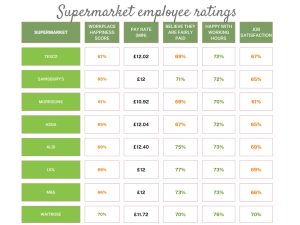The past couple of months have seen UK grocer’s raising staff pay, however remuneration is just one of many factors that make an employer a great place to work.
We take a look at which grocery retailers are considered the ‘best’ employers, what factors other than pay are most important, and where there is room for improvement.
Is pay the most important factor for supermarket employees?

Pay has been a big focus area for supermarkets, with many of the big chains including Tesco, Asda and Waitrose upping the salary of hourly-paid workers over the past month.
WorkL – the world’s largest live workplace happiness database, which was founded by former Waitrose managing director Mark Price – says that competitive pay is undeniably important when recruiting new employees.
A spokesperson told Grocery Gazette: “Our research at WorkL collected for tens of thousands of retail workers shows that pay and pension are strong drivers of satisfaction with where they work.”
However, they believe there are six steps to what WorkL describes as ‘Workplace Happiness’, including reward and recognition, empowerment, job satisfaction, instilling pride, wellbeing and information sharing.
The spokesperson says that increasing pay “is likely to improve happiness scores, as long as the other six steps are looked after too,” however adds that “time will tell if the increased pay rate will impact their average happiness score”.

Data: WorkL
At the time of writing, WorkL’s employee data shows that the majority of staff at Sainsbury’s, Waitrose, M&S and Aldi believe they are fairly paid, while Lidl has the highest rating on pay at 77%.
Waitrose parent company the John Lewis Partnership chair Sharon White says she hears “day by day” that one of the main asks of partners is to “fix pay”.
White says the partnership is doing just that with a “historic” investment into pay, which takes the hourly base wage nationally to a minimum of £10.50 per hour from 1 April. She says this usurps the need to pay out a bonus, which the business opted to withhold once again this year.
However, Waitrose still lags behind its grocery rivals in salary, with Aldi currently the highest paying grocer at £12.40 per hour nationally and the only supermarket to offer paid breaks.
What other benefits are important to retail staff?

While WorkL refers to its ‘six steps’, it says add-ons such as staff discounts are particularly good benefits for retail employees, “arguably more than ever in light of the cost-of-living crisis”.
They explain: “Staff discounts are only meaningful if the employee is interested in consistently buying the products that the organisation sells, so for supermarket employees, a staff discount is very useful.
“Employees want to feel they can share fairly in the success of the organisation they work for, whether that be a bonus, discounts or other benefits.”
While Waitrose has come under scrutiny for not offering partners a bonus this year, White says that it “offers the most significant support and the most significant benefits for health, wellbeing, access to GPs, access for partners who may not have the ability to have a holiday.”
“So there’s a there’s a much broader set of benefits that we know our partners value because we’re in conversation with them day by day.”
Job comparison site Breakroom says that its rating system, which was created through reviews from thousands of employees, found that other than competitive pay rates, important factors that hold weight include having supportive and respectful managers, feeling safe at work, and the ability for an employee to select shifts that suit their work-life.
WorkL also notes the importance of flexible shifts for supermarket employees.
Currently, Morrisons offers a four-and-a-half-day week at its Bradford head office, while Asda has been trialling a four-day week for the same pay and benefits for managers in 20 stores since September.
Lidl offers head office staff the option to work from home permanently, while Tesco staff are able to request flexible working patterns from the first day of their job, rather than having to wait six months under current legal stipulation.
Sainsbury’s workers based at its head offices in Holborn, Coventry and Milton Keynes as well as its warehouses, and store managers in its 1,400 UK stores were given the option to work their 37.5-hour contracts in a seven-day week, which means some head-office workers could work on a Saturday and take a day off in the week, or could work longer weekday hours.
Speaking of the grocer’s flexible working policy, CEO Simon Roberts says Sainsbury’s is “pretty pleased” with the way it’s working.
“We try to make clear choices from the upfront. If it works better for you to work in this way and you can get your job done, and it gives you the balance of what you need in your life as well, then that’s a win-win’.
“The productivity of this organisation is because people are more trusted and feel empowered, and take the decisions that they need to take to get their work done.
“I wouldn’t describe it as a four-day week, we describe it as smarter working,” he adds.
Which are the ‘best’ and ‘worst’ employers?

According to thousands of employee reviews collected by Breakroom, Aldi has been named best rated supermarket employer, closely followed by Waitrose.
Employees cited factors such as manageable workloads, clear head office communication and a healthy work-life balance as the key reasons for their job satisfaction at Aldi.
Meanwhile, sitting at the bottom of Breakroom’s list is Iceland and Morrisons.
Reviews on both supermarkets state that pay, hours and flexibility are among the factors that need to be improved on most.
Similarly, employee review site Glassdoor’s data also has Waitrose and Aldi in the top slots, however, this time Waitrose takes first place with a 4.2 out of 5 star rating.
The most commented benefits include sick pay, flexible working, employee discounts, and specifically Aldi’s pension plan and bike to work scheme, on Glassdoor.
With supermarkets across the spectrum investing not only in pay, but in adding other benefits and flexibility into their employment offering, businesses need to constantly improve what they offer in order to attract and retain staff in this competitive jobs market.










